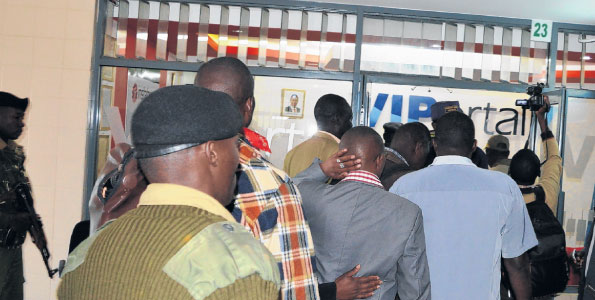Forex scam in Kenya: Mr Robert Siahi had big dreams in 2017. He wanted to pursue a degree course in a local university. Already an established trader in Limuru, Mr Siahi worried about financing his dream. During a meeting with one of his friends, he was encouraged to put his money in VIP Portal, a forex brokerage firm based in Limuru, Kiambu County.
“A few days later, I saw Mr Alfred Wangai discussing how profitable forex trading was on a local TV station,” Mr Siahi says. “The figures whetted my appetite and I decided to invest.”
Mr Alfred Wangai is one of the proprietors of VIP Portal. On April 16, 2014, Mr Siahi invested Sh106,000 and on May 22, 2014, he put in an additional Sh500,000.
Cost breakdown: Building a three bedroom house with Sh. 2.4 million
“My contract with Mr Wangai was supposed to bring me Sh1.2 million after 75 working days. It was to be disbursed within three phases but this never happened.” The loss was devastating. It ended Mr Siahi’s dream of joining university.
Mr Siahi is among 13,000 ‘investors’, who lost over Sh1.1 billion to VIP Portal in what could turn out to be the biggest forex trading scam in Kenya’s history.
Unsuspecting investors
Police investigations carried out revealed that VIP Portal received over Sh1.08 billion between October 2013 and September 2014.
The deposits were from unsuspecting investors in Limuru, Nairobi, Nakuru, Nyeri, Kisii and Kisumu.
According to Mr Siahi, Mr Wangai first opened his offices in Limuru on or around June 2013.
“After opening his offices at K-Unity Building (also known as Ushirika House), Mr Wangai tapped the locals to market his firm,” Mr Siahi says. “It was easy for us to believe in the people we were accustomed to.”
KQ Pilots Salary: What pilots at Kenya Airways earn (Updated)
By October 2013, VIP Portal had spread across Limuru. In some cases, Mr Wangai asked investors to sell their land and deposit the money with VIP Portal with a promise that he would more than double it in less than a month, Mr Siahi said.
VIP Portal promised a five per cent commission per month for every new member an investor brought in. As investors in Limuru shovelled their hard-earned savings into the firm, so did their counterparts in Nyeri, Kisumu, Kisii, Nakuru and Nairobi.
The minimum the investors were required to part with was Sh25,000. Meanwhile, Mr Wangai turned to television talk shows to market his firm. His right-hand man, Mr Felix Oluoch, was his chief online publicist.
In messages to investors, Mr Oluoch, who describes himself as “a technical forex trader, a technical qualitative analyst and a strategist, a hedge fund trader and an international entrepreneur”, said Mr Wangai was paying 60 to 80 per cent dividends in four months.
He claimed that VIP Portal had a global office at a little known island St Vincent and the Grenadines.
A few weeks before investors began demanding payments, Money has learned, they questioned the existence of an international office.
Contacted, the Financial Services Authority of St Vincent and the Grenadines denied licensing VIP Portal. But in a sworn affidavit on July 17, last year, Mr Wangai maintained that the firm was incorporated under the Companies Act on August 1, 2013 and incorporated as an international business in St Vincent and the Grenadines since August 2013.
Offshore accounts
On 7 July, 2014, a Nairobi court stopped any transaction in VIP Portal’s four accounts — VIP Portal Ltd, VIP Forex Savings and Co-operative Ltd, VIP Institute of Forex at Family Bank, and VIP Portal Ltd at Barclays Bank.
By the time the accounts were frozen, the firm had a balance of Sh174 million since its directors, Mr Wangai, Mr Collins Thumbi Mundia, Mr Daniel Komo, and Ms Nkatha Karimi had withdrawn much of the Sh1.08 billion.
In a letter dated July 30, 2014 from the Law Society of Kenya to the Inspector-General of Police and copied to the CID director and the Central Bank, VIP Portal received deposits from Ms Bernise Kirungi, Mr Francis Thuo and Mr James Mbuthia amounting to Sh3,061,585 between April 29, 2014 and June 10, 2014.
In a reply to the law society, the Inspector-General of police noted that VIP Portal had been under the investigation of the DCIO, Limuru, since March 2014.
The DCIO wrote to Central Bank seeking to establish whether VIP Portal was registered by the regulator to trade in forex or carry out any banking business. Central Bank denied licensing it.
Additionally, in a letter signed by officer in charge Joseph Mugwanja, on May 20, 2014, the Banking Fraud Investigations Unit started an inquiry, which established that between October 1, 2013 and May 28, 2014, VIP Portal received Sh1.08 billion from investors.
Of this amount, Sh7.6 million was paid out to Ms Karimi and Mr Mundia, Sh19.3 million was wired to the accounts of FXCM Markets Ltd of US, while Sh528 million was noted to have been paid out to the investors.
In August 2014, VIP Portal opened new ‘accounts’ abroad to facilitate deposits. “We have over 5,000 accounts abroad that need to be catered for and hence the reason why we partnered with UBA Bank,” Mr Oluoch told investors. Notably, closing of the three local accounts has since become the reason that VIP Portal uses to counter accusations by its investors.
Take this message by Mathews Mutonga to VIP Portal: “I invested Sh50,000 in April 2014 and I received Sh30,000 once and the dividends stopped coming. I paid Sh400,000 and received Sh320,000 once and the dividends stopped.
Then I paid Sh300,000 and got nothing.” In its response, VIP Portal said, “It is the banks that are holding your money, not VIP Portal.”









